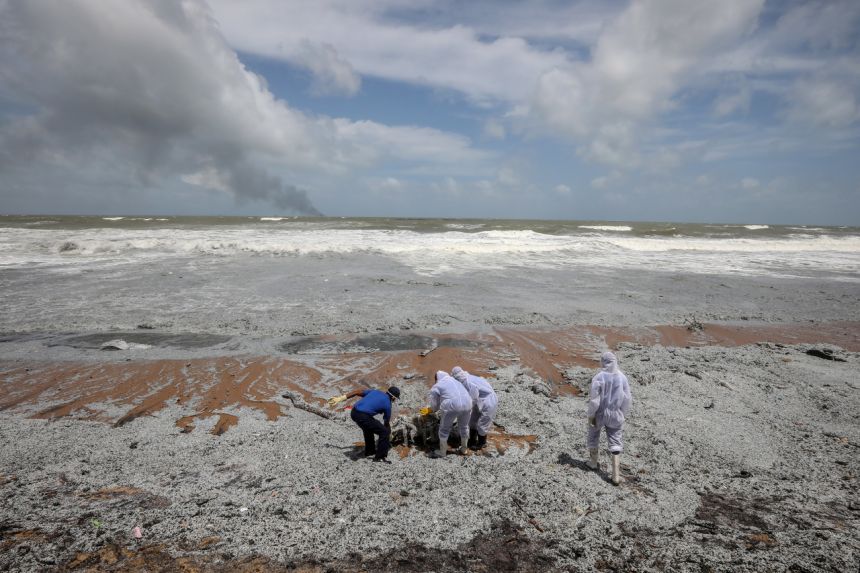The MV X-Press Pearl is still burning in an anchorage off the coast of Colombo in Sri Lanka, a week after it caught fire. According to the Sri Lankan Navy, flocks of thick smoke and minor flames can still be seen soaring up from the ship as of Thursday, the 28th morning. The Indian Coast Guard is assisting with firefighting efforts in several fronts.
Authorities suspect the fire outbroke due to a nitric acid leak, and there were at least 28 containers of pellets in the container, which are used as a raw material in the packaging business. It also contains 25 tons of nitric acid, an unidentified amount of ethanol, and lubricants in its containers. Kanchana Wijesekera, the State Minister of Fisheries, stated that coastal fishing between Panadura and Negombo has already been prohibited. Furthermore, He stated that a decision has been made to provide financial help to fishermen who are being affected by the MV X-Press Pearl incident. Environmental groups and authorities are now strategizing ways to avert an impending oil leak, which would most certainly have an impact on port operations, marine life, and tourism.
According to the Marine Environment Protection Authority, the condition has resulted in a severe marine environmental disaster. Sri Lanka is one of Southeast Asia’s biodiversity hotspots. The ship’s debris and cargo were unloaded at different locations off the coast today, from Panadura to Kalutara. Dead fish were discovered on the shore while a dead sea turtle was found today on shoreline. When officers from the Wildlife Office examined the deceased fish, they discovered fragments of plastic in its stomach. “Sri Lanka is one of the most bio-diverse countries in Asia, and this sort of plastic pollution, particularly from microplastics, might have long-term consequences,” said Marine Environment Protection Authority chair Dharshani Lahandapura. According to the media, a team of officials from National Aquatic Resources
Research and Development Agency was assigned to gather samples in order to perform a research to estimate the extent of marine pollution given that chemicals and other materials from the ship had already been fallen into Sri Lankan waters.

The United Nation’s Global Agenda has prioritized saving our oceans, which must continue to be a priority. Marine biodiversity is vital to human health and the environment. Marine protected areas must be successfully administered and adequately resourced, and policies must be implemented to decrease overfishing, marine pollution, and ocean acidification.

Goal 14, Life below water, efforts are being made to guarantee that care is taken with this vital global resource, which is a critical aspect of a sustainable future in marine biodiversity. Targets 14.1,14.2,14.3 explicitly state that all preventative measures must be strengthened in order to overcome any adverse consequences that may emerge in such situations.
This calamity has demonstrated that humans should team-up and fight for what truly matters. “Saving the pearl of the Indian ocean” by smartly alleviating the effects of the MV X-Press Pearl will go down in history as an evidence that our efforts to save the planet was real. It is high time for us to pool our technological resources and develop strategic plans to form a human alliance to defend life below water. Allies and institutes from across the world must unite with Sri Lanka to rescue the beautiful pearl and the lives below water.
Kavindya Piyasumana is a self driven researcher, who is passionate about addressing social, economic, and political issues and developing potential solutions to public discomforts.


